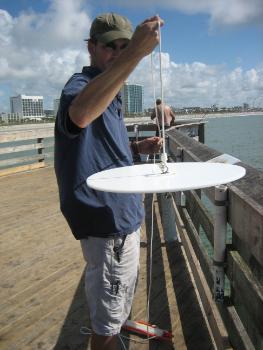EQL Services and Quality Assurance
Services
The scope of the Environmental Quality Lab's chemical and microbiology capabilities extends to sampling programs for municipal and industrial wastewater, groundwater, surface water and saltwater. The lab performs work on a routine basis for university students and faculty, private citizens, local communities, counties and companies. The lab maintains certifications with South Carolina Department of Health and Environmental Control appropriate to the categories of testing and data usability requirements. View certification »

- Biochemical Oxygen Demand (BOD)
- Chlorophyll / Pheophytin
- Conductivity / Salinity
- Dissolved Organic Carbon (DOC) and Total Organic Carbon (TOC)
- Dissolved Oxygen
- Enterococci bacteria
- Fecal coliform bacteria
- E. coli and Total Coliform bacteria
- qPCR analyses
- Toxicity
- Nutrient analyses total nitrogen and total phosphorus
- Field sampling and analyses, including from groundwater wells, piers, and small boats
- pH
- Water flow
- Residual Chlorine
- Temperature
- Total Suspended Solids (TSS) / Volatile Suspended Solids (VSS)
- Turbidity
- Color
- Technical advice and consulting
Quality Assurance Policy
The goal of the Environmental Quality Lab (EQL) is to use the concept of total quality management to produce analytical results of known, documented, and acceptable quality. The reliability of the data resulting from day-to-day sampling and analysis depends on a strong, effective, and consistently practiced quality assurance (QA) program. The EQL’s Quality Assurance Manual (QAM) outlines that program for all aspects of laboratory chemical and microbiological testing operations. EQL’s objectives for precision, accuracy, and detectability of analytical results, and the associated quality control (QC) measures are described.
The EQL QA program is dynamic in nature. It currently encompasses activities for traditional wet chemical analysis techniques, classical and state-of-the-art instrumental analysis methods, and field measurements using portable analysis equipment. The program is designed to facilitate the fulfillment of EQL’s and the client’s goals for its analytical products. It must also satisfy applicable university, local, state, and federal regulatory and program requirements. As such, the QAM is updated as required, based on the results of quality assurance monitoring of analytical processes, internal and external assessments, and changing regulatory policies.
EQL Standard Operating Procedures (SOPs) for chemical testing, which contain specific details of laboratory and method QC practices, are provided in a separate manual. SOPs are also updated as required.
The laboratory director of EQL assumes responsibility to ensure that all laboratory staff understand laboratory QA/QC practices, and their revisions, and implement them immediately. As part of his or her initial orientation, each laboratory staff member is required to read the QAM. The employee is required to document, through their signature, that they have read and fully understand the scope of this document. Signed statements to this effect are placed in the employee’s QA training file. Employees are expected to practice policies outlined in these documents as a matter of habit.
EQL is committed to conducting scientific work ethically and pursuant to the highest standard of honesty and integrity. This requires providing a work environment free from financial, commercial, and other pressures that would adversely affect the quality of work performed by its personnel. Quality control systems are in place to help identify analytical quality deficiencies. It is the responsibility of each staff member to implement the guidelines of the QAM and to begin the process of corrective action where quality deficiencies are observed. Within the laboratory, both the laboratory director and laboratory senior technician maintain the authority to stop work for deficiencies of quality originating from any source.
Data Quality Objectives
The structure of the laboratory's organization and QA program is designed to most effectively and efficiently accomplish established data quality objectives (DQOs) for its analytical services. The quality of measurements made by the laboratory is determined by the following DQOs, or characteristics: representativeness, accuracy, precision, detectability, completeness, and comparability.
Specific objectives for each characteristic are generally established to assist in the selection of appropriate sampling and analytical protocols and to identify applicable documentation, sample handling procedures, and measurement system procedures. These quality objectives are established based on site conditions, requirements of the project, and knowledge of available measurement systems, and they are addressed whenever appropriate for the data generated.





